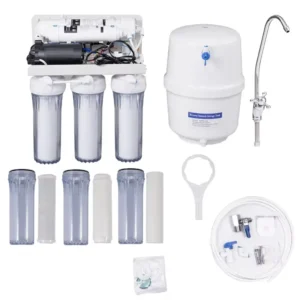Does Poor Water Quality Increase Dementia Risk in the Elderly?
Emerging research suggests that poor water quality may be a contributing factor to an increased risk of dementia in the elderly,
adding to the growing list of environmental factors that affect brain health. This is because contaminated water can contain a variety
of toxins that have been linked to cognitive decline, including heavy metals, pesticides, and nitrates.

adding to the growing list of environmental factors that affect brain health. This is because contaminated water can contain a variety
of toxins that have been linked to cognitive decline, including heavy metals, pesticides, and nitrates.

Heavy metals such as lead, aluminum, and arsenic are particularly concerning. Lead, even in low levels, has been shown to damage
the brain and nervous system, and studies have linked long-term exposure to an increased risk of dementia. Aluminum, which is
present in many water supplies due to its use in water treatment and plumbing, has been associated with the development of Alzheimer’s
disease, the most common form of dementia. Arsenic, a naturally occurring toxic metalloid, has been linked to cognitive impairment and
an increased risk of dementia in older adults.

the brain and nervous system, and studies have linked long-term exposure to an increased risk of dementia. Aluminum, which is
present in many water supplies due to its use in water treatment and plumbing, has been associated with the development of Alzheimer’s
disease, the most common form of dementia. Arsenic, a naturally occurring toxic metalloid, has been linked to cognitive impairment and
an increased risk of dementia in older adults.

Pesticides and herbicides, which can contaminate water sources through agricultural runoff, are another group of toxins that may affect
brain health. These chemicals can disrupt the nervous system and cause inflammation, which has been linked to the development of dementia.
Water Purifier Factory, Water Purifier For Home, Water Purifier Machine,Water Purifier, Water Filter Purifier System
brain health. These chemicals can disrupt the nervous system and cause inflammation, which has been linked to the development of dementia.
Water Purifier Factory, Water Purifier For Home, Water Purifier Machine,Water Purifier, Water Filter Purifier System
In addition to using a water purifier, there are other steps that can be taken to reduce exposure to waterborne toxins, such as testing your
water supply regularly and avoiding the use of pesticides and fertilizers near water sources. By taking these steps, you can help protect
the brain health of yourself and your loved ones, potentially reducing the risk of dementia in later life.
water supply regularly and avoiding the use of pesticides and fertilizers near water sources. By taking these steps, you can help protect
the brain health of yourself and your loved ones, potentially reducing the risk of dementia in later life.
Does Poor Water Quality Increase Dementia Risk in the Elderly?

